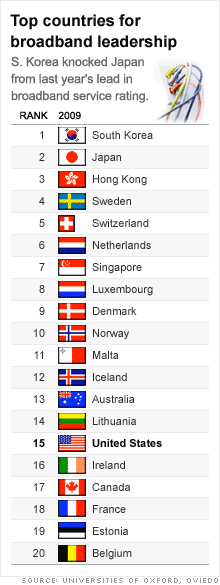U.S. broadband lags Asian nations
South Korea edges out Japan for providing top quality broadband service in 2009 study. The U.S. didn't even make the top 10.

NEW YORK (CNNMoney.com) -- South Korea leads the world in providing broadband services, according to a study released on Thursday. The United States did not make the top 10.
South Korea dramatically improved the speed, quality and availability of its Internet service in 2009, pushing past Japan, the former worldwide leader, according to a team of business students from the University of Oxford in England and the University of Oviedo in Spain.
The study, sponsored by Cisco (CSCO, Fortune 500), examined 66 countries and 240 cities. Broadband leadership was measured by various factors, including the number of wired households, where South Korea scored 97%. Hong Kong, which was rated number three in overall broadband leadership, had an even higher penetration, at 99%.
In terms of overall leadership, Hong Kong was followed by Sweden, Switzerland, the Netherlands, Singapore, Luxembourg, Denmark and Norway.
The United States did not make the list's top 10, even though it made "significant, above average improvements" in quality, the study said.
In terms of broadband Internet quality, the U.S. lags behind not only Sweden, which leads Europe, but the island nations of Malta and Iceland, and the former Soviet Bloc country of Lithuania.
The top three cities with the best overall broadband services -- Yokohama, Nagoya and Sapporo -- were all in Japan, the study said.
Japan also led the way for providing quality services outside major cities. But the study showed that the biggest digital quality divide between urban and rural areas was in Lithuania, Russia and Latvia.
"The Broadband Quality Study shows us which countries have made real moves towards the Internet of the future," said Professor Maria Rosalia Vicente of the University of Oviedo, in a written statement. "It also provides fresh evidence of the urban-versus-rural quality divide. The challenge for countries now is to bridge this quality divide."
The study's researchers judged broadband quality by measuring upload and download speeds, network latency and capacity. For their benchmarking, they tested out typical applications used today such as video streaming, Web browsing and social networking.
But they also took a look at which countries have the broadband quality necessary for handling future applications, like high definition Internet television and video communications, which they expect to become common in the next three to five years.
That list features nine countries, including the leaders South Korea, Japan and Sweden, as well as former Soviet nations Lithuania, Bulgaria and Latvia. The U.S. didn't make the cut. ![]()

